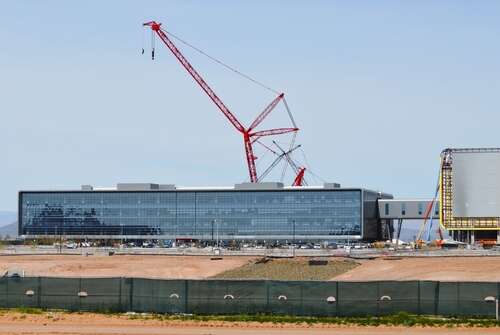
Taiwan Semiconductor Manufacturing Co (TSMC) is set to receive $6.6 billion from the US Commerce Department as part of its efforts to increase US chip production.
The subsidy, granted through the CHIPS and Science Act, will support advanced semiconductor production in Phoenix, Arizona, as US President Biden seeks to boost domestic chip making capacity. The company has also been offered up to $5bn in low-cost government loans.
TSMC has agreed to expand its planned investment in the state by $25bn to $65bn, adding a third Arizona semiconductor fabrication plant (fab) by 2030. This marks the largest foreign direct investment in a greenfield project in US history, said the Commerce Department.
“The CHIPS and Science Act provides TSMC the opportunity to make this unprecedented investment and to offer our foundry service of the most advanced manufacturing technologies in the United States,” said TSMC chairman Dr Mark Liu. “Our US operations allow us to better support our US customers, which include several of the world’s leading technology companies. Our US operations will also expand our capability to trailblaze future advancements in semiconductor technology.”
The Taiwanese company plans to produce “the world’s most advanced nanometer technology” at its second fab, set to open in 2028. TSMC Arizona’s third fab will produce 2nm or more advanced process technologies depending on customer demand. US secretary of Commerce Gina Raimondo also anticipates that the upcoming projects will generate around 6,000 direct manufacturing jobs and 20,000 construction jobs.

Bolstering US advanced chip production
TSMC is the world’s largest chipmaker, manufacturing over 90% of the world’s advanced chips and supplying major tech companies like Apple, Nvidia and Qualcomm. Its Arizona fabs should play a central role in its ability to support growing capacity demand from major tech businesses, developing chips for end uses such as smartphones, autonomous vehicles and AI data centre servers.
Through the investment in TSMC Arizona, the Biden administration is taking a “significant step in strengthening US economic and national security”, said the Commerce Department, “providing a reliable domestic supply of the chips that will underpin the future economy, powering the AI boom and other fast-growing industries like consumer electronics, automotive, Internet of Things, and high-performance computing”.
TSMC’s US clients have been understandably happy about the development. “TSMC is at the leading edge of advanced semiconductor technology — and when that expertise is paired with the ingenuity of American workers, incredible things are possible,” commented Apple CEO Tim Cook. “We are proud to play a key part in the expansion of TSMC’s US production, and we’ll continue to invest in America and support a new era of American advanced manufacturing.”
Reducing dependence on foreign supply of chips
The scaling up of government support for domestic chip manufacturing is notable. Intel was recently granted $8.5bn in government grants and up to $11bn in loans to subsidise advanced chip production and build sites in Arizona, Ohio, New Mexico and Oregon.
Semiconductors have become an increasingly politicised topic. Looking beyond Arizona’s status as a key battleground state in this year’s US general election, the need to boost domestic manufacturing capacity is now seen as a matter on fundamental national security on both sides of the aisle. TSMC’s dominance in the chip industry has led to global reliance on semiconductors manufactured in Taiwan. The Biden-Harris administration has sought to onshore advanced chip supply to reduce dependence on a market subject to growing undertainty, given China’s ongoing undermining of Taiwanese sovereignty.
To this end, the CHIPS and Science Act approved in 2022, includes $52.7 billion in research and manufacturing subsidies for boosting domestic semiconductor output. Additionally, lawmakers approved $75 billion in government loan authority.
TSMC Arizona has committed to supporting the development of advanced packaging capabilities through US partnerships, allowing customers to purchase advanced chips entirely made on US soil.






